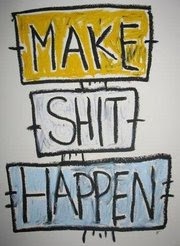There is always a lot of talk around the Plannersphere town about different types of planning and new types of planning, I guess it’s a part of our trade to discuss and define what we do and how we’re doing it, which on one side is cool, always interesting thoughts brought to the table, and another side I sometimes find the overuse of often ill defined or even meaningless jargon as well as rehashed conversation themes somewhat tedious.
Now don’t get me wrong, I love a good conversation and I think it’s a juicy topic for planners, I get into these and I also use quite a bit of jargon, I think it’s inevitable. I typically use lots of jargon as an easy or lazy way out of explaining what I actually mean, to impress in a meeting and/or because we talk so much BS most days that no one will question another jargon word in a meeting and nod as if it makes complete sense. Or they’ll counter BS with another bunch of jargon words. Until the meeting is over and no one is really clear what it was all about or what the next steps are. And of course, I’m exaggerating to make my point, I’m sure you get it.
Regarding planning there’s account planning, brand planning, comms planning, digital planning, PR planning, creative planning, etc. More recently I’ve seen agile planning, micro planning, real time planning, engagement planning, social media planning, innovation planning planning by doing, etc. Then to make things more interesting there’s the conversations about strategy and the difference with planning, if there is one. On top, you can also apply all the previous varieties of planning to strategy, so we get digital strategy, social media strategy, etc. Then we can also blend in order to get strategic planning, or even digital strategic planning, agile strategic planning, etc. I could go on, but you probably get the idea.
However interesting I’ve found many blog posts, articles or presentations on these topics the more terms of the kind I read, the less sense they make at all. And let’s remind ourselves that planning is nebulous for most people to start with, I find adding more varieties and different definitions doesn’t necessarily help.
In a rare attempt at a relatively thoughtful post, I’m now going to go against what I just said and I’ll add a new piece jargon to our ever growing collection of fancy vocabulary. I’m going to tell you what kind of planning I enjoy, give it a name, and tell you what it is. It’s already been said in several other ways by other planners and thinkers out there so it’s not ground breaking or rocket science, it’s just a variation on a theme.
Over the past few years, I’ve been asked a few times what kind of planner I am and just saying I’m a planner doesn’t seem sufficient. The voice of reason and convention says I’m a digital planner because that’s the kind of projects I have the most professional experience with and I enjoy them, but then I also tend to go into a lengthy explanation about the fact that I consider myself a planner and that the digital part of the title is just because some people understand better, or think they do, with that point specified.
I’m now ready to answer this question about what kind of planner I am, and as I previously mentioned I’m lazy so I’m going to give it a jargon name and if people adopt it, then I won’t have to explain anymore, and I’ll save myself a few minutes for every meeting or conversation where I should have explained it otherwise, which would be fantastic.
I call it Making Shit Happen Planning.
Using it as an acronym will also allow everyone to save precious tiny bits of time, avoid potential awkward usage of an excretion type word as well as add to the general nebulous nature of planning altogether, and lastly so other people don’t ask questions in fear of being caught not knowing the latest jargon out there.
You guessed it, now we have MSH Planning. That’s my kind of planning.
So what is MSH Planning?
Excellent question, thanks for asking.
I work in the sort of general marketing and communications industry and sometimes clients need stuff to happen. They tell me what they need happening (or if you’re in an agency sometimes the account manager type people come up and tell the planner what the client said they wanted happening; a meeting might be taking place) and then I ask them some questions about what they need happening, to make sure I really understand what they want / need. I usually find that the more questions I can think of asking them and the more answers I can get, then the better I am at MSH Planning.
The stuff clients need happening of course often involves making sales happen, but the stuff in question can also be extremely varied and different; anything from figuring out what their new brand should be to posting the right kind of content on Twitter (Yes, those two are totally related). I think that’s where all the different types of planning come into play, but let’s put them aside for now. Once I’m happy I understand well enough what the client needs happening, or the client gets bored of my questions – whichever comes first, I go away – and this is the tricky part, pay attention – I develop a plan for how the stuff needed by the client is going to happen.
For a quick reminder I just checked planning with my trusty Google Dictionary:
- What?
- Who?
- How?
- Where?
- When?
Once I’m confident I have a good plan that is going to make that shit the client wants actually happen, I can go back and present it. Some negotiations may be involved at this stage, in order to come to an agreement on the plan. Then the plan goes ahead and if the shit intended happens, it was a good plan.
That’s pretty much it. I’ll recap:
- A client wants something to happen
- I ask a few questions to make sure I understand what they want
- I go and develop a plan to make the something happen
- We agree on the plan
- Plan goes ahead
- Results
- The something intended happened, the plan was successful
- The something intended did not happen, the plan unsuccessful





*applause*
I couldn't agree more
Cheers for the comments!
This is basically how I approach all of my plots and schemes throughout the day. Probably right down to making dinner or pitching clients.
Hope we can talk Making Shit Happen in person soon.
My interview here is 100% agree with you, mate: https://unplanned.com.br/destaque/2818